For much of history, it seemed to be common wisdom that drinking alcohol was bad for you. In the past few decades, though, many studies have found the opposite, especially when it comes to wine.

A new study has found even more health benefits in wine.
Wine, and red wine in particular, are now thought to bestow a bevvy of benefits on imbibers including better cardiovascular health, mental function and even longevity. Supporting these salubrious suppositions further, a study out of Israel last month found that people who drank a glass of wine at dinner each night improved their cardiovascular health and lessened the effects of type-2 diabetes.
The study, which was conducted by the Ben-Gurion University of the Negev and published in the Annals of Internal Medicine, followed 224 subjects with type-2 diabetes for two years. The subjects were encouraged to eat a mostly plant-based Mediterranean diet low in animal fats, but not restricted calorically. They were split into three groups: one drank red wine, one drank white and the rest drank only mineral water. Those who drank wine only had one glass (150 mL) per day with a meal.
The study found that the group drinking red wine saw significant increases in their healthy high-density lipoprotein (HDL) cholesterol while decreasing their total cholesterol. Wine drinkers in both red and white groups exhibited better glycemic control and a big drop in components of metabolic syndrome as well compared with their counterparts in the water group.
No differences were noted in blood pressure or other factors across the groups, except the study did find that sleep quality improved in both wine groups compared to the water group.

Both red and white wine were found to have diabetes-related benefits.
The study attributes the positive changes in the wine-drinking groups both to the overall effect of drinking a (very moderate) amount of alcohol, as well as the heart-healthy benefits in the red-wine group to the higher levels resveratrol in it. The red wine drunk with a meal apparently also lowers peak blood sugar afterward. Spikes in blood sugar can cause inflammation and contribute to health problems including diabetes, but also heart disease and dementia as well. So by mitigating that spike, red wine might help prevent any number of other health issues.
That said, the researchers and everyone else who has commented on the study notes that the key here is moderate wine consumption. So have some wine with dinner tonight…but not too much!
Any other interesting wine stories catch your eye lately? Tweet me about them @clustercrush.

